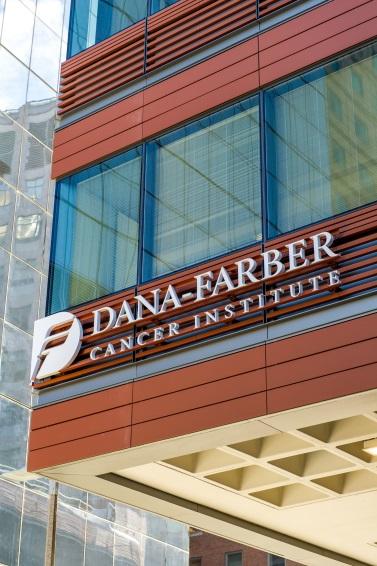Women leaders raise over $250,000 for women’s cancers research at Dana-Farber and hear about latest in early detection and prevention
Over 300 local women business and community leaders attended the 2019 Susan F. Smith Center for Women’s Cancers Executive Council Breakfast on April 5 raising more than $250,000 for research at Dana-Farber Cancer Institute, exceeding their goal. This annual breakfast presents the latest cutting-edge research and treatment being conducted at Dana-Farber to help eradicate women’s cancers. Funds raised support the Smith Center’s Innovation Fund for new research.
Executive Council Breakfast Co-Chair and Dana-Farber Trustee, Debbie First said, “As a 40-year ovarian cancer survivor treated at Dana-Farber, this is the most exciting time in the research and treatment of women’s cancers. Forty years ago, the word ‘cancer’ was whispered and ‘women’s cancers’ wasn’t even a term. Today, Dana-Farber has the Susan F. Smith Center for Women’s Cancers and we are hearing about a blood test for early detection of ovarian cancer.”
The program featured a panel discussion on the latest research in early detection and prevention of women’s cancers moderated by Ursula Matulonis, MD, Chief of the Division of Gynecologic Oncology. The panel included the following Dana-Farber faculty members:
Eric Winer, MD, Chief of the Division of Breast Oncology discussed the current challenges in early detection and prevention of breast cancer and the need to develop screening tools to test for additional molecular targets, beyond BRCA mutations, in order to catch these cancers as early as possible.
Dipanjan Chowdhury, PhD, shared information on a sensitive screening tool for ovarian cancer that he has developed, which is currently undergoing rigorous scientific validation. He told attendees that this blood test has great promise to accurately detect ovarian cancer in its earliest stages, when it is most treatable, with a near-term goal of application in high-risk women and the hope for more broad use in the future.
Jennifer Ligibel, MD, Director of the Zakim Center for Integrative Therapies and Healthy Living at Dana-Farber talked about the contribution of diet, exercise and body weight to breast cancer risk, as well as lifestyle-based prevention strategies, that can decrease a woman’s susceptibility to breast cancer.
The program included poignant remarks from a Dana-Farber patient, Shelley Smalley of Holliston, MA. In 2003 her routine annual mammogram detected some abnormalities and she was referred to Dana-Farber/ Brigham and Women’s Cancer Center. She had a lumpectomy and sentinel node biopsy that revealed she had breast cancer.
She and her husband had a difficult task in telling her young daughters about her diagnosis.
“Receiving a cancer diagnosis is scary but explaining it to three young children is even tougher,” Smalley said.
When she was diagnosed, her oncologist, Eric Winer, MD, told her about a newly approved dose dense chemotherapy regimen (chemotherapy administered every other week) that was shown to be more efficacious than the previously administered regimen given every three weeks.
“Enduring cancer treatment while trying to be a mother to three young children is not easy. My family, friends, and the Holliston community were so supportive. Friends took me to chemo appointments, neighbors delivered meals, other friends took on my carpool duties,” Smalley said.
A year after her diagnosis she tested positive for the BRCA1 mutation and had a prophylactic oophorectomy (removal of ovaries) as the BRCA mutation creates a higher risk for both breast and ovarian cancer.
In place of having a bilateral mastectomy, she was followed closely with a breast MRI and mammography. Her recent MRI results warranted a core biopsy which revealed ALH, atypical lobular hyperplasia, putting her at an elevated risk of developing lobular cancer in both breasts -- unrelated to her BRCA1 mutation.
Now, 16 years after her initial diagnosis, she’s considering a bilateral mastectomy and is in the information-gathering stage.
“I know whatever decision I make, whether to have the procedure done, or to take medication, the staff at Dana-Farber will support me,” Smalley said.
Alan D’Andrea, MD, director of the Susan F. Smith Center gave an update on the Center and announced the 2019 Susan F. Smith Center for Women’s Cancer Innovation Fund grant recipients. The grants are for up to $75,000 each and are given for basic, clinical, translational, or population science research projects related to breast and/or gynecologic malignancies.
The 2019 recipients are:
- Rinath Jeselsohn, MD, Breast Oncology Physician
Title: Exploiting the Clonal Dynamics during the Acquisition of Resistance to CDK4/6 Inhibition in WT and Mutant ER for Novel Therapeutic Strategies in Estrogen Receptor Positive Breast Cancer - Jennifer Ligibel, MD, Director, Leonard P. Zakim Center for Integrative Therapies and Healthy Living and Senior Physician
Title: Body mass index and breast cancer gene expression in women with early-stage breast cancer - Beth Mittendorf, MD, PhD, Director of Surgical Research and Director, Breast Immuno-Oncology Program
Title: Characterization of the Immune Microenvironment in Triple Negative Breast Cancer: Correlative Studies for the TOPACIO Trial Evaluating the Combination of PARP Inhibition and PD-1 Blockade - Huma Rana, MD, Clinical Director, Cancer Genetics and Prevention
Title: Optimizing treatment-focused genetic testing in metastatic breast and ovarian cancer patients (OPT- IN-MBOC)
Media Contacts
If you are a journalist and have a question about this story, please call 617-632-4090 and ask to speak to a member of the media team, or email media@dfci.harvard.edu.
The Media Team cannot respond to patient inquiries. For more information, please see Contact Us.
